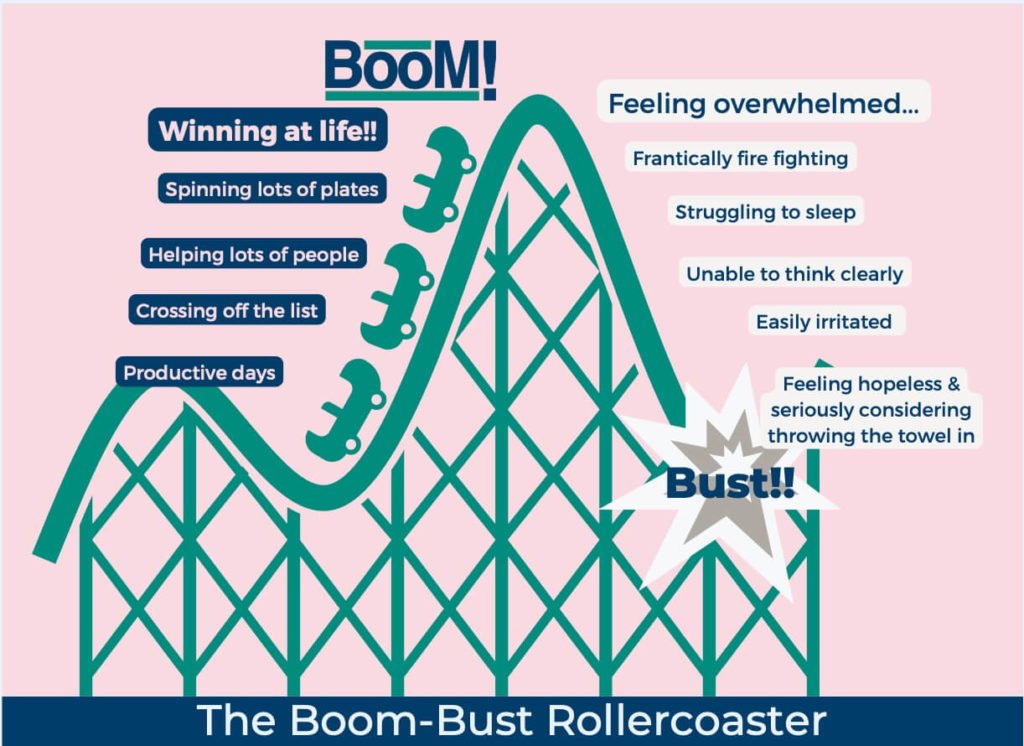Have you ever come back to work after being away on holiday, and as soon as you’re back to it, you are on fire??!
You’re cracking through things, and you have renewed energy and vigour to deal with things that just felt too much to deal with before you went away. What’s more, if any problems do crop up whilst you’re in this energy, you just handle it, like water off a duck’s back!
Now technically, a flow state is what happens when you are so focused on a single activity or task that you become completely immersed in it. There are great benefits to your wellbeing associated with being in this state of flow, and it is often associated with creative and artistic tasks, as well as sports.
However, what I described above is slightly broader than that.
It is most definitely about finding your flow, but on a bigger scale.
You will no doubt have experienced it at some point. It’s one of those really good days, where everything just seems to go right, and happens with ease. You feel like you could take on the world…and you’d probably win too!
When they come around, these days feel incredible.
But the problem is, they often disappear again, just when you really need to be firing on all cylinders.
At some point, you move out of feeling capable, calm and in-control, and instead it tips over into feeling like there is way too much to do. You can’t think clearly because you feel so overwhelmed, so you end up frantically jumping from one task to another in a bid to get it all done!
If you haven’t heard me talk about it before, I call this cycle the Boom-Bust Rollercoaster.

It summarises the pattern I just described, where the good days that are full of energy, drive & flow, inevitably, at some point, tip over into the bad days where worry, doubt and indecision tend to hang out.
And when these pesky things are around, they steal your focus, zap your energy and motivation and you end up being less and less productive with your time.
If you’re anything like me, when you are in this space, you end up beating yourself up as you get more and more frustrated that you aren’t making the progress that you had planned on.
Nightmare!
So the question really is, how did that blissful state of flow come about in the first place?
And how can you get back to it and help it to stick around?

I’ll let you in on a little secret here.
That state of flow, and those good days where everything flows with ease… that is your natural state.
Think about it…
When you get back to work after a holiday, you don’t have to actively do anything to make it happen, you just naturally have more energy, see things more clearly, have better perspective and instinctively know what needs to be done.
As a result, it flows, you get loads done and you feel really positive about it. Your actions likely lead to results and that motivates you even more.
So it’s not so much about how you find that flow state, but more about what you’re doing that disrupts it.
That’s where the stress response comes in.
Whilst our stress response (our fight or flight system) is designed to be switched on for short periods of time to help get us out of danger and even enable us to thrive in high pressured situation, when it is switched on for long periods of time, it causes all sorts of problems for your brain and body.
For example, when the stress response is regularly active:
- It primes you to be hyper alert and aware, so you look out for further danger (hello overthinking mind that won’t switch off)
- You’ll be much more likely to see the negative first (that will be where the doubt, worry and being hard on yourself kicks in).
- And it means your muscles tense, your heart beats faster and your breathing becomes faster and more shallow to help make sure you are ready to fight or run away.
So if you ever suffer with stiff and achy shoulders, tension headaches, heart palpitations or shortness of breath, a chronically active stress response could be the cause.
You see, in our busy, fast-paced modern lifestyle, our stress response is activated regularly throughout the day. That might be from your alarm blaring, or finding hundreds of emails you need to deal with in your inbox, the kids screaming, a disagreement, or someone cutting you up whilst driving.
There are loads of things that happen throughout the day that might trigger a small dose of stress.
In it’s own right, it wouldn’t cause you any problem. But all together, they have a cumulative effect, and mean your stress response is chronically active.
The examples I gave above are nowhere near an exhaustive list of how the stress response affects your brain and body, but as you can see, it has far reaching effects and impacts both your performance and your health.
So what’s the answer?
Have you got to stop living your life to stop the stress response becoming chronically active?
No, not at all. But here’s a few things you can do:
1. Increase your self awareness
Recognising when your stress response is active, and understanding and recognising your triggers is key.
Acknowledge when you feel stressed, anxious, worried, tense, overwhelmed or anything else that you’d rather not be feeling.
And when you do, take a few moments to explore the feeling:
- What physical sensations can you feel in your body?
- What’s the emotion underneath the feeling?
- What happened to trigger this to appear?
2. Activate the relaxation response.
The relaxation response (via the parasympathetic nervous system) is the opposite of the stress response (via the sympathetic nervous system), and both cannot be activated at the same time.
So to reduce your stress response, you need to activate your relaxation response.
There are many ways you can do this from breath practices, meditation and yoga, to day dreaming (mental imagery), laughter, music, and loads more. It’s not a one size fits all approach and what you need at any one time will vary, so why not have some fun exploring ways to help dampen down your stress response and find what works for you!
I explore multiple ways you can do this and guide you through uncovering the methods that are right for you throughout the Guilt-Free workshops. There are also sessions to help you explore and overcome your triggers, and eliminate the habits that keep fuelling the Boom-Bust Rollercoaster. To find out more about the Guilt-Free programme, click here.
3. Be more strategic in your approach.
We can’t simply put life on hold to prevent the stress response from ever being activated. And to be honest, small amounts of stress help us to thrive and grow, and so can be very useful indeed. It is when it tips over into damaging effects on your health, and frustrating effects on your productivity and performance, that the stress response becomes unhelpful.
So instead it is about planning your activities to intersperse stress-inducing days and activities with time out, or activities that you know allow you to relax your body and/or calm your mind.
This doesn’t mean you have to take big chunks out of your day though.
In fact I share a number of quick-win tips to help calm the overthinking brain and maintain your flow throughout the month of July (and January, as the programme repeats every 6 months) in the Guilt-Free workshops, where the theme is Switch off to Switch on.
If you’d like to come along to try out either of the workshops, click the links below to head to the booking page. If it’s your first time, when you get to the checkout, make sure to use the code TRYITOUT to get your spot for free!
Friday 7th July 2023, 11.30am-1pm: Calm the overthinking brain and access your intuition instead
Friday 21st July 2023, 11.30am-1pm: Creativity, inspiration & productivity: Maintaining your flow




